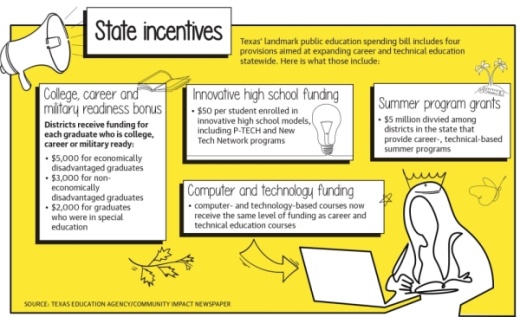Coppell, Irving and Carrollton-Farmers Branch ISDs are all expanding courses and programs that better equip students with industry skills and certifications prior to graduation.
This push comes as employers and school districts are finding recent graduates lack the skills needed for industry jobs.
“The skill gap that we’re seeing in manufacturing these days is ... fairly big,” said Chris Flemming, general manager of local aluminum machining company Alexandria Industries. “Any time that you’re ... trying to hire people, they’re missing all of the basic skills when it comes to the machining industry.”
Looking forward, both CFBISD and IISD are launching new early college high schools over the next two years, while CISD is launching a North Lake College construction program.
Those additions are due in part to a new state law, House Bill 3, that has the state pumping billions of additional dollars into public schools. With the law come financial incentives, reimbursements and grants divvied out to school districts for the purpose of expanding their career and technical education programs, according to the Texas Education Agency.
“House Bill 3 was a celebration for us because it really validated from [the] state that this is where we’re going,” said Jo Gillen, CFBISD executive director of career, college and military readiness. “Students need ... to feel attached and part of something that makes sense for them in school and helps them find their niche of what they’re going to do or not do.”
Some of the existing career- and technical-based tracks at the three school districts include auto body repair, business management and administration, and information technology.
Read below for more information on how each school district is expanding its career and technical education offerings.
Carrollton-Farmers Branch ISD
Clear on CFBISD’s horizon is a campus expansion project at R.L. Turner High School to make room for a new Pathways in Technology Early College High School program, or P-TECH.P-TECH programs typically enroll students in college-level courses beginning in their freshman year of high school. The students are then on track to receive an associate degree and industry-based certification upon graduation.
“We are definitely going after P-TECH for each of our high school campuses,” CFBISD Community and Support Specialist Katie Bourne said.
Part of the new funding from HB 3 includes for districts a $50 incentive per student enrolled in an innovative high school model, such as P-TECH or New Tech Network programs.
CFBISD’s new early college program will focus on an existing auto technology track conducted in partnership with Dallas County Community College District staff.
CFBISD also offers training for 32 industry certificates. Among them are culinary arts, welding and advanced animal science.
That experience can pay dividends later, said Melanie Williams, CFBISD college, career and military readiness specialist.
“Students don’t have to be done when they leave high school,” Williams said. “They can choose to continue their path, ... whether that’s in going into management or ... starting with a biomedical certification and then going into medical school later.”
As an alternative, students who learn basic trade skills can opt for local entry-level jobs after graduation, said Flemming, who offers CFBISD students machining experience.
“Students graduating out of high school ... can really make $15 an hour if they got some of these basic skills,” he said.

Coppell ISD
CISD has been offering career- and technical-based courses since before the passage of HB 3, said Ron-Marie Johnson, CISD director of career and technical education and fine arts.The district is now ensuring that its qualifying career and technical courses align with the Texas Education Agency’s new standards, she said, while exploring how to offer various programs of study to students.
“We want our kids to get through them and have some industry-based certification in every area, plus actual real-world experiences in every area,” she said.
CISD has recently provided students with cybersecurity experience with the help of Checkpoint Software in Irving.
“They’re one of our business partners on our advisory committee,” Johnson said. “They worked with our students for two days and are helping support them to earn a certification and to get them to real-world experience.”
CISD provided 14 career- and technical-based programs of study this year, which, in total, encompass 78 courses—44 more than in 2016-17, according to the district.
Each additional aligned course means more state funding for CISD each year. It has also received additional funding as part of the HB 3 provision for innovative high school models. New Tech High at Coppell generates an extra $50 per enrolled student for the district.
CISD is also building on its partnership with North Lake College to offer a new program for the 2020-21 school year.
“Next year will be our first group of kiddos who will be starting at North Lake with their new campus at Royal Lane in the construction program,” she said. “They’ll go directly into dual-credit classes their junior and senior year.”

Irving ISD
IISD is expanding on a yearslong push to have students identify their preferred pathway of study.“Since House Bill 3 passed, our programs have become even stronger,” IISD Signature Studies Director Shawn Blessing said. “Our students at the high schools are [on] a pathway that begins in the ninth grade. ... Their capstone course then provides them with either industry experience, certifications or an on-site enterprise.” IISD is also partnering with North Lake College to launch college-level programs over the next two years, according to the district.
The Singley Collegiate Academy will enroll its first students in August. Those students will eventually split their time between the collegiate academy and the nearby North Lake central campus, which are within walking distance of one another.
Blessing said the district is also starting to plan for a new early college high school.
“We’ll have our first meeting to begin planning with our community partners and with North Lake College,” she said. “That’s supposed to be housed at the South Campus.”
Students not enrolled in one of the early college programs can still take courses in IISD programs of study, many of which lead to industry certification, Blessing said.
“More than 90% of our programs have an opportunity for students to earn a certification. A real certification—one that [the] industry values,” she said.






